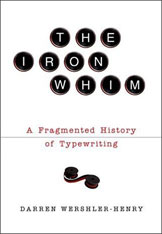 Joan Acocella has an interesting review in The New Yorker of Darren Wershler-Henry’s recent book The Iron Whim: A Fragmented History of Typewriting (previously discussed here on if:book). It’s worth a look just for all the juicy backstory it delivers on the typewriter as well as accounts of various writers’ intense, sometimes haunted, relationships with their machines. But Acocella also delves into an important area that apparently gets only passing consideration in the book — the way writing has changed since the advent of computers. Reading this makes you remember that with word processors we’ve all been writing “born digital” texts for quite some time:
Joan Acocella has an interesting review in The New Yorker of Darren Wershler-Henry’s recent book The Iron Whim: A Fragmented History of Typewriting (previously discussed here on if:book). It’s worth a look just for all the juicy backstory it delivers on the typewriter as well as accounts of various writers’ intense, sometimes haunted, relationships with their machines. But Acocella also delves into an important area that apparently gets only passing consideration in the book — the way writing has changed since the advent of computers. Reading this makes you remember that with word processors we’ve all been writing “born digital” texts for quite some time:
Mallarmé spoke of the uncertainty with which we face a clean sheet of paper and try, in vain, to record our thoughts on it with some precision. As long as we were feeding paper into a typewriter, this anxiety was still present to our minds, and was revealed in the pointillism of Wite-Out, or even in the dapple of letters that were darker, pressed in confidence, as opposed to the lighter ones, pressed more hesitantly. A page produced on a manual typewriter was like a record of the torture of thought. With the P.C., the situation is altogether different. The screen, a kind of indeterminate space, does not seem violable in the same way as the page. And, because what we write on it is so effortlessly and undetectably erasable, the final text buries the evidence of our struggle, asserting that what we said was what we thought all along. Wershler-Henry suggests that the P.C.–with some help from Derrida and Baudrillard–ushered us into a world in which the difference between true and false is no longer cause for doubt or grief; falsity is taken for granted. I don’t know if he was thinking about the spurious perfection of the computer-generated page, but it would be a useful example.
Something else to think about is the effect that the computer, with its astonishing capabilities, has had on us as writers. Take just one example: the ease of moving a block of text. Highlight, hit control X, move cursor, hit control V, and, presto, that paragraph is in a new place. Of course, we were able to move things in typewritten text, too, but all that business with the scissors and the tape made us think twice, and maybe it was wise for us to hesitate before changing the order in which our brains produced our thoughts. In recent years, I have read a lot of writings that seemed to say, “This paragraph is here because it seemed an O.K. place to shove it in.” Furthermore, by allowing us to move text easily, computers influence us to write in movable units. In the novel that won Britain’s Booker Prize last year, Kiran Desai’s “The Inheritance of Loss,” there is a line space, indicating a break of thought, every three pages or so.
